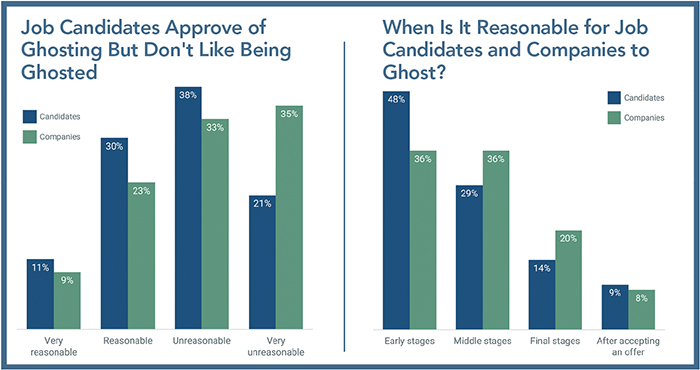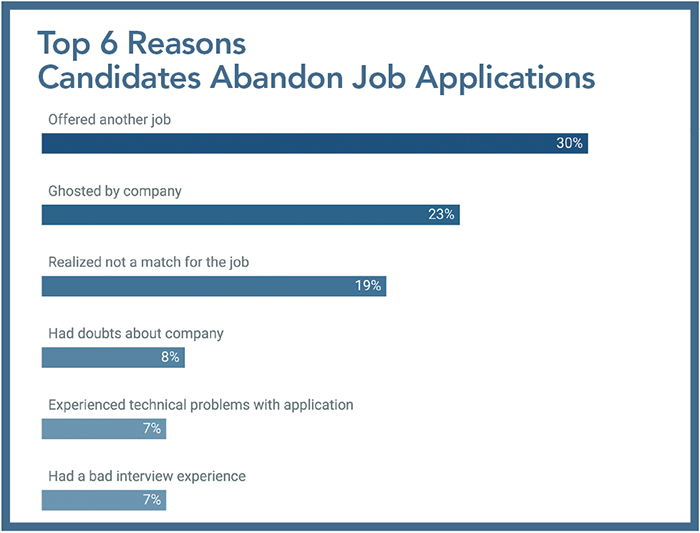Fueled by record-low unemployment, the ongoing U.S. economic boom has boosted most employers’ bottom lines.
But to Eric Van Duren, director of system talent acquisition at Spectrum Health in Grand Rapids, Mich., one not-so-welcomed outgrowth of rising stock markets and falling unemployment has been “ghosting.”
Loosely defined as the practice of ending a relationship by suddenly, inexplicably withdrawing from all communication, ghosting is no longer just an online-dating phenomenon or a way to slip out of a party. According to experts, ghosting has increasingly crept into the workplace, and it’s causing pain–mainly lost time and wasted resources–for HR, employers and recruiters.
“The primary factor for the rise of ghosting in the talent area is a robust economy,” says Van Duren, noting that a booming economy raises the likelihood job candidates will have a number of options during their search. “When a candidate has multiple opportunities, it increases the chances of them disengaging from your hiring process.”
There are recent data to strengthen the notion that ghosting, practically unheard of in recruitment even as little as two years ago, should be starting to scare employers looking to stay well-stocked with talent.
According to a survey on workplace ghosting from Clutch, a B2B research, ratings and reviews firm in Washington, 507 full-time employees and job applicants polled disapprove of companies that ghost more than they disapprove of candidates who ghost. In fact, 35 percent say it’s “very unreasonable” for a company to ghost an applicant, compared to only 21 percent who say it’s “very unreasonable” for an applicant to ghost a company. Also, nearly half of job seekers (41 percent) believe it’s reasonable for candidates to ghost employers.
Among job seekers who believe ghosting is reasonable, 48 percent believe it’s best to ghost during the early stages of the interview process, and the further an interview process progresses, the less acceptable they view ghosting. Still, nearly one in 10 job seekers thinks it’s reasonable for an applicant to ghost after he or she accepts a job offer, or for a company to ghost a candidate after it extends an offer (8 percent). Among those who have ghosted employers, the most common reasons given were that they accepted another job offer (30 percent), never heard back from the company (23 percent) or decided the role was not a match (19 percent).
“Ghosting often boils down to something less dramatic than you might think,” according to Michelle Delgado, the content developer at Clutch who managed the research project. “It can just be that people miscommunicate on both sides.”
A surprising survey result, Delgado notes, was the role inaccurate job postings can play in prompting candidates to disengage. For example, a person may think he or she is interviewing for a public-relations job, start the interview process and halfway through realize the employer was actually looking for a salesperson.
“Sometimes [employers are] posting very generic, inaccurate job descriptions,” she says. “That can snowball into making the candidate feel like the company doesn’t really care who they’re hiring or maybe they don’t really know what they’re looking for. Ghosting may follow.“
According to Jodi Chavez, president of Randstad Professionals, a staffing firm that primarily works in the financial and legal fields, ghosting isn’t just an interview trend; it also is happening well into the employment relationship. For instance, she explains, a person may start a job, work a week or even up to a year … and just decide not to come back on Monday.
“We have had cases where people are sending emails at 2 a.m. on a Saturday to their employers saying, ‘I resign,’ ” she says. “That’s happening more and more.”
In other cases, Chavez says, employees report to the office and resign in person, with a little bit of a conversation yet without the two-week courtesy notice, the de facto standard.
Beth Zoller, legal editor at XpertHR, says that in the past, job seekers often submitted resumes and even went on interviews without ever hearing back from the employer. In a reversal of that scenario, she says, hiring managers are seeing a rise in candidates failing to show for interviews and individuals leaving jobs without formally quitting.
“It’s especially happening among in-demand employees in the tightening job market,” she adds.
Jo Weech, founder and principal consultant at Exemplary Consultants and an experienced HR and recruiting professional, says that during the past year she saw the situation firsthand from both sides–as she sought a full-time job in recruiting while working as a recruiting consultant.
“I honestly was shocked to be ghosted by recruiters, even ones with whom I had multiple phone interviews. In one case, we even had a face-to-face interview,” she says, adding that it’s little wonder job candidates feel they can treat employers the way they themselves were treated. “My first question for employers is, ‘Have you ghosted job candidates?’ If the answer is yes, then you have to start there. Do not work another minute in the recruiting profession unless you make a solemn commitment to never do it again.”
Understanding Disengagement
According to Spectrum Health’s Van Duren, the company prides itself on having a team made up of skilled and professional recruiters who understand the reasons why a candidate may disengage from the hiring process and how to help candidates make the best possible decision.
 “It’s important for recruiters to connect and establish a relationship with their candidates so they can transparently talk through things, such as rate of pay, competing job offers and what the transition would look like,” he says.
“It’s important for recruiters to connect and establish a relationship with their candidates so they can transparently talk through things, such as rate of pay, competing job offers and what the transition would look like,” he says.
Van Duren notes Spectrum Health adjusted its high-volume hiring process to decrease the chances of a candidate ghosting. It developed an interview “blitz” model that eliminates many of the traditional delays that can come with the hiring process. To accomplish this, Van Duren’s team partnered with hiring managers to pre-identify specific days each week for candidates to interview. Job seekers are then scheduled directly into those interview slots and often receive job offers the same day as their interview.
“Speeding the process up while still conducting high-quality interviews has led to us hiring a higher percentage of candidates we offer jobs to,” he says.
Randstad Professionals’ Chavez says guarding against ghosting boils down to respect, but the meaning of that word in the recruiting world has seemingly become diluted recently.
In the past, employers saw hiring from the standpoint that a prospective employee needs the job, she says, but now the tables are more balanced. “Today, it must be a mutually beneficial relationship between the applicant and the company,” she says.
“I think this is where we are seeing the candidates say, ‘Wait a minute. I deserve some feedback and respect,’ and companies are responding,” Chavez adds, noting employers should offer an automatic response to applicants.
“That way, there is an expectation from the company that says this is what it would expect as well,” she says. “Saying that from the start is important.”
Streamlined Hiring
Los Angeles-based Janelle Bieler, vice president at Adecco Staffing, says one of the best things companies can do to reduce ghosting is to streamline the hiring process.
For example, candidates in certain industries have a shelf life of only 24 hours, so Bieler urges her clients to react quickly during the hiring process to lock in top talent before a competitor does. This can be done by reducing the number of interview rounds in order to maintain the attention of promising candidates. According to Adecco’s recent U.S. Workforce Report, 87 percent of respondents said they prefer no more than two rounds of interviews during the hiring process.
Another strategy for streamlining the interview process is utilizing artificial intelligence. Unlike human recruiters, AI can operate 24/7.
“This means that a candidate who applies for a position after normal business hours can be pre-screened by the AI tool that night and, if they pass, can set up an interview for the next morning,” Bieler says.
Adecco has found that candidates are more likely to ghost if they feel they are being left in the dark about the interview process, she says, so recruiters and employers must take the time to outline the steps and expectations with the candidate during the first interview.
“Most of all, be open with candidates about the process,” she says, explaining that employers should highlight tentative timeframes, including when an offer might be made. If an offer is extended, Bieler says, it’s a best practice to set a deadline for the candidate to accept or reject the position. Let the candidate know that if he or she doesn’t respond by the deadline, the offer might be rescinded.
“It’s important to keep candidates engaged throughout the interview process,” she says, adding that this can be done by regularly providing updates on where the applicant stands and encouraging him or her to follow up with any questions or concerns.
Changing Realities
XpertHR offers a step-by-step guide for employers to reduce ghosting, starting with keeping the lines of communication open.
Additionally, Zoller notes, HR and recruiters should personalize the recruiting process and conduct meaningful interviews, preferably face-to-face sessions where they can get a good read on the candidate. It is important to attempt to ascertain the candidate’s motivations, long-term goals and aspirations, and try to learn as much as you can beyond the resume or application, she says. HR and recruiters should be open, friendly and receptive to questions, and provide concrete answers so that candidates remain engaged.
It is also important to maintain a positive workplace culture and brand, Zoller adds. Throughout the recruiting and hiring process, the employer needs to make potential candidates understand the benefits of working for the employer. However, thanks to ever-evolving social-media platforms, candidates are able to conduct thorough research on a workplace and gain insights into a culture before ever stepping foot inside. “And if they don’t like what they read, you may be at risk of being ghosted,” she says.
Exemplary Consultants’ Weech, a charter member of the Association for Talent Acquisition Professionals, says the ghosting phenomenon won’t change overnight, but if everyone in talent acquisition stopped ghosting candidates, the trend on the candidate side would likely slow down and maybe even disappear. Of course, a sudden downward swing in the economy also could change the candidate-employer dynamic.
“Let’s start with ourselves before we try to fix others,” Weech says.

